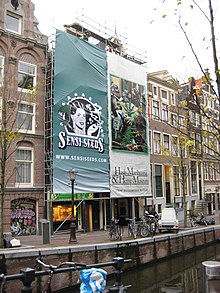Dutch drug policy
The Dutch drug policy would prevent drug users in the black market have to go to on cannabis to come. The Dutch drug policy therefore provides for small quantities of this drug to be allowed for private consumption. For this purpose, there are several hundred coffee shops in the Netherlands that are allowed to sell up to five grams of cannabis per person. The consumption of all other drugs, including the legal drugs alcohol and tobacco, is prohibited in coffee shops. The purchase of marijuana and hashish is permitted there after the age of 18. On May 1, 2012, three southern provinces ( Limburg , Noord-Brabant and Zeeland ) introduced the “Wietpas” (German: grass pass) as a model experiment, which was then introduced throughout the Netherlands at the end of the year. This failed due to protests and was only limited to these three provinces after a short time, with each city there also being able to decide independently against the Wietpas.
development
Since 1976, possession of 30 grams of cannabis has been tolerated (not prosecuted), although it is a criminal offense under the law. In the Netherlands, however, the principle of opportunity applies in criminal law . This enables the police and the public prosecutor's office to refrain from prosecution at their own discretion.
When the law was amended in 1995, the regulations were tightened: Since then, cannabis may only be sold to people over the age of 18 and only in a maximum amount of five grams per person. It was previously allowed to be given to young people aged 16 and over. Commercial cannabis cultivation, wholesale, import and export are still prohibited and will be prosecuted. Other drugs are also prohibited.
But cannabis was never legal in the Netherlands either, it was merely tolerated. Coffee shops are allowed to store a maximum of 500 grams of cannabis in the store and sell up to five grams per customer. The entire production and wholesaling are illegal, so that a very special "back door problem" arose. As a result, there is no state control over the cultivation methods used and no consumer protection. This means that the coffee shops cannot be supplied legally. A parliamentary majority therefore called on the government on June 27, 2000 to resolve this problem.
Since December 1, 2008, fresh mushrooms containing psilocybin have also been banned in the Netherlands . Before the ban came into force, there was therefore a huge rush on the coffee shops . Until 2008, the mushrooms were still legal when fresh. They had previously been banned as a dried product.
Another problem is drug tourism , as the cultivation and possession of cannabis is prohibited in all nearby countries (especially in Germany and Belgium ).
In February 2017, the Dutch parliament voted in favor of controlled hemp cultivation. The left-liberal D66 bill was passed with 77 votes to 72. If the First Chamber still agrees, there will be legal supplies for coffee shops in the future and the back door problem will be eliminated. The Netherlands would be the third country in the world (alongside Uruguay and Canada ) and the first country in Europe to legalize or regulate cannabis for private use.
Opinions
The policy of tolerance is not undisputed in the Netherlands either. Among other things, it is about whether coffee shops can be operated near schools, how high the density of coffee shops can be in a community, and whether foreigners are allowed.
On December 12, 2010, Maurice De Hond published a survey that found that 54 percent of Dutch people are in favor of legalizing soft drugs . 39 percent are against it. A total ban or an immediate closure of all coffee shops are in favor of 31 percent. 47 percent welcome the introduction of a wietpas in the run-up to the introduction. Men, leftists and young people are more positive than the average towards soft drugs . Of the supporters of the right-wing populist PVV , 44 percent reject legalization, of the left-wing liberals of D66 only 12 percent (extreme values in each case).
Web links
- Dutch drug policy since the 1990s ( University of Münster )
- cannabislegal.de: The drug policy of the Netherlands
Individual evidence
- ↑ It's LEGAL here. Retrieved September 19, 2016 .
- ↑ Last trading day for "Magic Mushrooms": Mass rush to drug stores. In: Spiegel Online . December 1, 2008, accessed June 10, 2018 .
- ↑ Michael Knodt: Dutch Parliament votes for controlled cannabis cultivation . In: German Hemp Association . February 22, 2017 ( hanfverband.de [accessed March 3, 2017]).
- ↑ n-tv news television: precedent in Netherlands: cannabis cultivation legalization is approaching . In: n-tv.de . ( n-tv.de [accessed on March 3, 2017]).
- ↑ Peil.nl: Softdrugs en de wietpas (December 12, 2010) ( Memento of the original from November 8, 2012 in the Internet Archive ) Info: The archive link has been inserted automatically and has not yet been checked. Please check the original and archive link according to the instructions and then remove this notice. , Accessed December 17, 2010.


